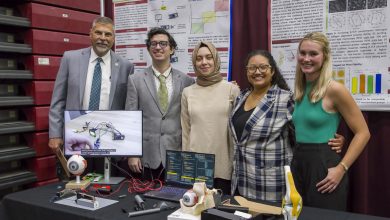Florida Tech Grant to Help Prepare Students for Opioid Crisis Assistance
A $1.2 million federal grant will help better prepare Florida Tech psychology students to make a difference in the opioid crisis.
The university was recently awarded a $1.2 million, three-year grant from the U.S. Department of Health and Human Services to boost current doctoral clinical psychology curriculum by providing both more specialized training in opioid and substance use prevention and treatment, and experience in providing these and other behavioral health services via a telebehavioral health platform.
The program, “Opioid and Substance Use in Integrated Behavioral Healthcare,” focuses on a method that uses a team of primary care and behavioral health clinicians to implement a systematic and cost-effective approach to patient-centered care for a defined population.
Florida Tech is one of the few schools in the country to offer the program at the pre-doctoral level, allowing students to better compete for internships and jobs, program lead and School of Psychology professor Vida Tyc noted.
The patient is first screened to determine what kind of care he or she would be best suited for, ranging from in-house clinical therapy to being referred off-site for medication-assisted treatment. A similar process is involved for the telebehavior program, with patients at remote locations being able to receive treatment from students via computer. The students also provide follow-up support using cognitive behavioral health strategies.

“The telehealth component is big because it allows us to reach underserved patients who are in low socioeconomic areas, or are in rural areas where they may not have access to behavioral health services,” Tyc said.
During the three years of the project, 35 clinical psychology doctoral students will work alongside medical providers and receive training at Brevard Health Alliance, Brevard County’s only federally-qualified health center, and Parrish Medical Group.
Using a mix of substance abuse treatment components and current education, Tyc is integrating procedures in the classroom.
“What we try to do is weave didactics about opioid use into the curriculum, and I also meet with our students for advanced training on these topics,” she said. “We talk about things like opioid and substance use, as well as pharmacological management, pain management issues, all kinds of issues that are related to these problems. So, we build it into the curriculum and then we hope to also educate the faculty who are supervising students.”
Florida Tech students’ training also involves working with different practitioners, from nurses to medical providers and medical assistants. They learn how to communicate and collaborate professionally, a key skill in an evolving care system that is learning about opioid addiction and how to combat it.
“We’re working collaboratively with our agency partners and medical teams, so integrated behavior healthcare is a unique field,” Tyc said. “We think it’s one of the unique aspects of our program, that students have these opportunities.”
###




